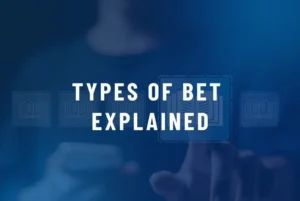Types of Bets Explained: The Complete UK Guide for 2026
Sports betting can be confusing for beginners with so many terms like “acca” or “each-way.” This guide explains every major bet type clearly, from simple singles to advanced system bets, so you can place smarter wagers with confidence.

Introduction: Why Knowing Bet Types Matters
If you’ve ever opened a bookmaker’s app and been instantly flooded with terms like Accumulator, Each-Way, or Trixie, you’re not alone. The world of sports betting can seem like an entirely new language — part numbers, part jargon, and a sprinkle of mystery. Yet, behind those terms lies the true art of betting: knowing what type of bet suits your risk appetite, your goals, and your understanding of the game.
Knowing bet types isn’t about trivia or showing off at the pub. It’s about three key advantages that separate casual punters from smart bettors:
- Making informed choices — You can tailor your bets to your comfort level, whether you prefer steady singles or thrilling accumulators.
- Avoiding costly mistakes — Many beginners place the wrong kind of bet and lose money even when they’ve picked the right winner.
- Maximising potential returns — By choosing the right format, you can turn modest stakes into substantial wins.
In this guide, we’ll walk through every major bet type offered by UK bookmakers, explaining them in plain, relatable language. Whether you’re eyeing the Premier League, a flutter on Cheltenham, or a quirky special on “the next manager sacked,” you’ll soon understand exactly what’s on your betting slip — and why it matters.
Single Bets: The Foundation of Betting
Every great betting journey starts with a single bet — the simplest form and the best place to learn the ropes.
What It Is
A single bet is one wager on one outcome. You’re backing one team, one player, or one horse to win. If it wins, you get paid; if it doesn’t, you lose your stake.
Example
You bet £10 on Manchester United to beat Arsenal at 2/1.
- If United wins, you receive £30 (£20 profit + £10 stake).
- If they lose, your £10 stake is gone.
Why It Matters
Single bets are perfect for beginners because they’re straightforward and easy to calculate. You know exactly what needs to happen — your pick wins, you win.
Common mistake: Many punters forget that fractional odds include the stake. So “2/1” means you get £2 profit for every £1 staked plus your £1 back.
Each-Way Bets: Double the Coverage
Each-way bets are a British classic, especially popular in horse racing but also used in golf and even football top-scorer markets.
What It Is
An each-way bet is actually two bets:
- One on your selection to win.
- One on your selection to place (finish in the top positions — usually 2–5 depending on the event).
So, your total stake is double your base stake.
Example
You place a £10 each-way bet on a horse at 10/1.
- Total stake = £20 (£10 win + £10 place).
- If the horse wins:
- Win part: £10 × 10/1 = £100 profit.
- Place part (¼ odds): £10 × 10/4 = £25 profit.
- Total return = £125 + £20 stake = £145.
- If the horse only places, you just get the place payout (£25 + £10 stake = £35 return).
Why It Matters
Each-way betting cushions the blow of a near-miss. You might not win big, but you’ll often win something, especially when backing outsiders.
| Term | Meaning |
|---|---|
| Win part | Bet on the selection to win outright |
| Place part | Bet on the selection to finish in top positions |
| Fractional odds | The portion of odds bookies pay for a place (e.g., ¼ or ⅕) |
Common mistake: Thinking each-way means “double the winnings.” It actually means double the stake.
Accumulators: The All-or-Nothing Bet
Known fondly as the Acca, this is the stuff of betting folklore — tiny stakes turning into life-changing wins.
What It Is
An accumulator combines several selections into a single bet. To win, every selection must come good. One loss, and the entire bet fails.
Example
You bet £10 on:
- Liverpool to win
- Chelsea to win
- Tottenham to win
If all three win, your payout multiplies all the odds together — turning a small stake into a potentially massive return.
Why It Matters
Accas are thrilling because of their potential. You can turn a few pounds into hundreds, sometimes thousands, if luck is on your side.
| Type | Selections | All Must Win? |
|---|---|---|
| Double | 2 | Yes |
| Treble | 3 | Yes |
| Fourfold | 4 | Yes |
| 5-fold or more | 5+ | Yes |
Pro tip: Stick to smaller accas (doubles or trebles) for realistic wins. The more legs you add, the higher the bookmaker’s edge.
Doubles, Trebles, and Fourfolds: The Building Blocks
If the accumulator is a skyscraper, these are its lower floors.
- Double: Two selections; both must win.
- Treble: Three selections.
- Fourfold: Four selections.
Example
You bet £10 on a treble at odds of 2/1, 3/1, and 4/1.
If all three win, your returns compound, meaning each winning leg rolls into the next — like interest on your money.
Why not just place three singles? Because a treble pays far more. However, if one selection fails, you lose it all — that’s the trade-off.
System Bets: Mixing Strategy with Safety
System bets are for punters who want to spread risk while keeping the potential for high rewards. Instead of one big accumulator, you’re covering several combinations of bets.
Let’s look at the main types.
| System Bet | Selections | Total Bets | Includes Singles? | Minimum Wins Needed |
|---|---|---|---|---|
| Patent | 3 | 7 | Yes | 1 |
| Trixie | 3 | 4 | No | 2 |
| Yankee | 4 | 11 | No | 2 |
| Lucky 15 | 4 | 15 | Yes | 1 |
Example Scenario
You place a £1 Yankee on four horses.
That’s 11 bets, costing £11 in total.
Even if two horses win, you’ll get some return because several doubles and trebles will have succeeded.
Why It Matters
System bets give you breathing room. You don’t need every pick to win — just enough to keep your bet alive.
Common mistake: Misunderstanding the total cost. Each combination counts as a separate bet, so the total stake can rise quickly.
Forecast and Tricast Bets: Predicting the Order
If you like horse or greyhound racing, forecast and tricast bets test your ability to predict exact outcomes.
- Forecast: Pick the first and second in the correct order.
- Reverse forecast: Covers both possible orders (costs double).
- Tricast: Predict the first, second, and third in the exact order.
Example
You predict Horse A finishes 1st, Horse B 2nd, and Horse C 3rd. If they come in that exact sequence, the payout can be huge — but so are the odds against it.
To make sure you make the best of this, make sure you understand How Betting Odds Work.
These bets reward precision but carry high risk.
Placepot: The Pool Betting Favourite
Run by the Tote, the Placepot is a unique horse racing bet that blends fun, strategy, and a dash of community spirit.
You must pick a horse to place (not necessarily win) in each of the first six races at a meeting.
If all your horses place, you share the pool with other winners.
Example
You place a £1 Placepot bet:
- All six of your horses place.
- The total pool pays £150 per £1 unit.
- Your return = £150.
Why It Matters
Placepots add excitement across an entire race card and can produce impressive returns, especially on unpredictable days.
| Feature | Description |
|---|---|
| Bet Type | Pool (Tote) |
| Races Covered | First six |
| Payout | Shared among winners |
| Stakes | Often low, starting from 10p |
Asian Handicap Bets: Levelling the Playing Field
A popular format in football betting, Asian Handicap removes the possibility of a draw, making outcomes more balanced.
Example
Man City -1.5 vs Crystal Palace +1.5
If you back Man City, they must win by 2 goals or more for your bet to win.
Handicap lines often include “quarter goals” like -0.25 or +0.75, which split your stake between two outcomes — reducing risk and volatility.
Why It Matters
- Makes mismatched games more competitive for bettors.
- Reduces bookmaker margins.
- Great for experienced football punters.
Over/Under Bets: Focus on Totals, Not Winners
Instead of predicting who wins, you’re betting on how much action happens in a game.
Example
Over 2.5 goals in Man United v Liverpool
If the game ends 2–1, 3–0, or 2–2 — you win.
If it’s 1–1 or 2–0, you lose.
Over/Under markets can also apply to corners, cards, or points in other sports.
Both Teams to Score (BTTS)
Simple, fast, and popular among football fans — BTTS does what it says.
You’re betting that both teams will score at least once during the match.
- “Yes” means both score.
- “No” means one or both fail to find the net.
Odds depend on the teams’ attacking records and recent form.
Draw No Bet
A safer version of a standard win bet.
You back a team to win, but if the game ends in a draw, your stake is refunded.
It’s ideal for tight matchups where a draw feels likely, but you still lean toward one side.
Correct Score: The Prediction Challenge
Think you can call the exact result? Then Correct Score betting is for you.
Example
You predict Spurs 2–1 Arsenal.
If the match ends 2–1, you win — at big odds, often 6/1 or more.
If it ends any other way, you lose.
This bet type is thrilling but tricky — ideal for low-stake, high-reward punts.
In-Play Betting: Real-Time Action
Also called live betting, this lets you place wagers while the event is underway. Odds constantly change based on the action. We dedicated a full guide to the subject, if you want to learn more: In-Play Betting Explained.
Example
You back Novak Djokovic mid-match after he loses the first set, believing he’ll rally back. His odds are now higher — meaning higher potential returns if you’re right.
Tip: Be quick. Odds can change with every goal, point, or card.
Specials and Novelty Bets
Betting doesn’t stop at sport. Bookmakers also take wagers on entertainment, politics, and pop culture.
You might see odds for:
- The next manager to be sacked.
- Who’ll win Strictly Come Dancing.
- The outcome of a UK General Election.
These bets are fun conversation starters but come with high bookmaker margins. Treat them as light entertainment, not serious investment.
Practical Tips for Choosing Bet Types
Even with all this knowledge, the hardest part is knowing which bet suits your style. Here’s a quick comparison to help.
| Bet Type | Risk Level | Best For | Key Advantage |
|---|---|---|---|
| Single | Low | Beginners | Simple and clear |
| Each-Way | Medium | Horse racing | Covers win and place |
| Accumulator | High | Experienced punters | Huge potential returns |
| System | Medium | Strategic bettors | Multiple chances to win |
| Asian Handicap | Medium | Football experts | Removes draws |
| Over/Under | Low–Medium | Data-driven bettors | Based on stats |
| Correct Score | Very High | Casual thrill-seekers | Big payouts |
Final Advice
- Start with singles while you learn the ropes.
- Understand your total stake before placing system bets.
- Avoid massive accas unless it’s for fun — the odds are long for a reason.
- Bet smart, not emotional. Chasing losses with complex bets rarely ends well.
Remember, the best punters aren’t just lucky — they’re informed. Understanding bet types transforms you from a hopeful guesser into a strategic player who enjoys the game on every level.
Where to go next on our site
- Best betting sites in the UK – tested and verified reviews of the best bookmakers in the UK,
- Best free bets offers – clear analysis of self-tested welcome offers for new customers,
- Football betting guides – bookmakers reviews on football and soccer betting.
Safer‑gambling resources
- GAMSTOP self‑exclusion – register free to block online gambling accounts. (Gambling Commission)
- National Gambling Helpline (GamCare) – 0808 8020 133, 24/7. (GamCare)
- NHS: Help for problems with gambling – official support and clinic info. (nhs.uk)
- GambleAware – advice, tools and signposting to treatment. (GambleAware)
Compliance note on scope: This guide focuses on Great Britain under the Gambling Act 2005, regulated by the UK Gambling Commission. If you’re in Northern Ireland, check local arrangements before you bet.
This guide was created with AI assistance and reviewed by a human editor to ensure accuracy and clarity. It is intended for informational purposes only and does not encourage gambling.
FAQs About Types of Bets
Can I mix sports in an accumulator?
Yes! Many punters build accas from different sports, e.g. a football win, a tennis match, and a cricket result.
What’s the minimum stake for a bet?
Varies by bookmaker, often £0.10 or £0.50 for online bets.
Why do bookies offer bonuses on Lucky 15s?
To encourage multiple bets, as these carry higher bookmaker margins.
What does “Any To Come” mean?
It refers to bets where winnings from one bet automatically roll onto another, e.g. conditional bets.








